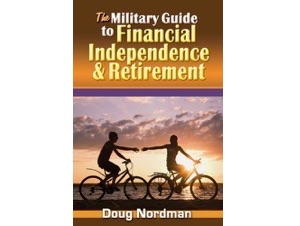A reader writes:
“Hi Nords, I have some fears about a market crash that would derail early retirement. If I retire now in my late 40s, it would be near impossible to get my job back in my line of work. It’s almost easier to retire even earlier… Because then one would not be too old to re-enter the workplace.
You’re right about extreme early retirement. I know several early retirees in their 30s (and one in their 20s) who are confident that they’ll be able to freelance their way to more income if they need to. But if you can accumulate the assets to retire early, you might always produce income through some entrepreneurial project.
My spouse and I have been through two “market crashes” during our early retirement: the tech recession of 2001-02 and the Great Recession of 2008-09. We’ve invested since the late 1970s, but both retirement recessions felt more painful because we were no longer covering our expenses with a paycheck. Today, though, we have the experience and confidence born of the crucible. Another recession wouldn’t bother us much, but we might find excellent investment bargains.
Fear
The biggest challenge of a recession is dealing with emotions: particularly fear. The first coping defense for your emotions is an asset allocation that helps you sleep at night. (Then you can lie in bed reciting the Bogleheads mantra “Stay the course!” until you doze off.)
But seriously, watching your portfolio meltdown through a recession is a test of mental toughness and stamina.
Can You Recover From a Stock Market Crash?
In a word, “yes,” you can.
The variables are the length of time it takes and how well you recover. Also, understand that the longer you’re in the market, the more you learn. That applies to your successes and your failures.
In other words, if you’ve been through a stock market crash before, you’ll learn lots of valuable things that will lessen the pain if and when it happens again.
It’s somewhat arbitrary to define what a stock market crash is, but to put things into perspective if the S&P 500 drops 7% in a single day, trading may be halted for 15 minutes. This is the equivalent of calling a time out to allow cooler heads to prevail.
Individual stocks are often halted based on news that impacts a company’s stock price (i.e., a bad earnings report, etc.), but the entire market has only been halted a few times in its entire history. In most cases, the market moves 1-2% at most in a single day.
In general, market crashes are emotional and, most of the time, reasonably short-lived. Understand that financial markets that are usually rational can behave irrationally, often based on world events such as the threat of war, economic news, and so forth.
Overall, the U.S. stock market has proven remarkably resilient in the long term. It routinely recovers from short-term crises and moves higher over extended time frames.
For example, from 1940 through 2020, the S&P Index has produced an average annualized return of more than 11%.
The key to recovering from a market crash is not to panic. Staying invested during crisis periods may seem counterintuitive, but it always turns out to be the best play.
How to Prepare for a Market Crash
There are several proactive steps you can take to minimize the impacts of a market crash on your assets.
Asset Allocation
When you have an asset allocation plan, you can feel as if you’re in control.
When you rebalance during a recession, you’ll end up buying more bargains at the bottom of the market. That confidence keeps you from panicking and selling out at the worst time.
When done the right way, diversification can insulate you in most instances. You can work with a financial advisor based on your investment and allocation goals. You may want to go with a “set it and forget it” strategy such as investing in a target-date retirement fund, as many 401(k) plans allow you to do, or using a robo-advisor where diversification is built in.
If you like to invest on your own, you MUST do your homework and adjust as you go along. But be careful not to get antsy and overcompensate based on short-term events. The best investing is done long-term and without panic.
Recession Investing
A second defense is educating yourself about asset allocation and recession investing. It’s more than merely following directions from a few excellent websites or books– it’s understanding some of the principles behind the advice and appreciating the history of markets.
I started with Dimson & Marsh’s “Triumph of the Optimists” and William Bernstein’s most excellent “The Four Pillars of Investing.” You can browse more books from the “investing” and “retirement” categories on the blog’s “Recommended Reading” list. It doesn’t matter what you read about asset allocation and recession investing as long as you read enough to react “Ho-hum, another swing of the pendulum.” Then turn off CNBC, step away from the computer, and go for a long walk.
Oddly enough, it also helps to share the misery when you’re afraid. One (free) approach is posting to financial independence forums where everyone is worried about the recession. You’ll see some posters buying gold bullion and shotgun shells, but the experienced investors will be waiting for their criteria to rebalance their portfolio.
You’ll also find plenty of reassurance. Other investors hire financial advisors just to have someone to hold their hand and tell them that everything will work out fine.
If you’re so inclined, be ready to buy on the dip. That’s where fortunes can be made over the long term.
Risk Assessment
Everyone has a different tolerance for risk based on several factors. Your age, size of your assets, past investing experiences, and whether or not you invest with the help of a stock advisor or do it on your own are just a few of the variables.
Another part of this is your emotional quotient. Fears and anger can negatively color your investing experiences. Fears and anger can negatively color your investing experiences.
Can you treat investing as a business proposition, or do you get emotionally involved with how your money is invested? Practical and logical approaches work best.
Financial Resources
The next challenge is financial: having the assets to survive a recession. Most recessions bottom out during the first year and start recovering during the second, so my spouse and I keep two years’ expenses in cash.
We begin every January with about 8% of our portfolio in CDs and a money market fund and start spending it on our expenses. At the end of the first year, if the market is up, we replenish the cash stash from dividends/interest or by selling a few appreciated shares.
If the market is down at the end of the first year, we start cashing in the CDs. By the end of the second year, we might have to contemplate selling equity shares, and they might be off their peak value, but we’ve never had to sell at a loss.
Another financial defense against a recession is longevity insurance. Every retirement portfolio should include some annuitized income, even if it’s “just” Social Security. When you reach financial independence, if you do not have a pension, then I strongly recommend creating one for yourself: plan for Social Security or put 20%-25% of your asset allocation in a single-premium index annuity. You’ll get a steady monthly income no matter what the stock market may be doing.
If you’re reluctant to trust an insurance company (and pay the fees for the longevity insurance), then I’d recommend a low-expense dividend equity index fund or a balanced fund, or even rental real estate. (We have a portion of our portfolio in the iShares Select Dividend ETF DVY.)
During the Great Recession, our dividend fund lost nearly two-thirds of its value from peak to trough, but its dividend payouts only shrank about 30% off their peak and then began to recover.
A year later, its share price was back near our cost basis, and it’s risen steadily ever since. (When we rebalanced our portfolio, we bought more shares.) Today it’s above its 2007 levels, but the dividends have grown faster than U.S. inflation (and a lot faster than our inflation!).
Landlords lost equity during the Great Recession but did well on cash flow because many tenants were former homeowners. Other disciplined and diversified dividend investors who held on during recessions (only selling if a company froze or cut its dividend) saw minimal reductions in income.
For even more stability (and less effort), you could buy a balanced fund like Vanguard’s Wellington or Wellesley, which combine both bond income and stock dividends and automatically rebalance their holdings.
Variable Spending
Another financial defense against recessions is variable spending. The 4% Safe Withdrawal Rate withdraws 4% during your first year and then boosts annual withdrawals for inflation every year afterward, but those assumptions are just easier for a computer to simulate. No human robotically follows that system.
Investor behavioral psychology says that the wealth effect inspires us to spend more during bull markets and cut our spending during recessions. If you find yourself tempted to boost your spending during a bull market, then at the end of the year, you could try to raise your cash asset allocation to 9-10% to give you a little more buffer during the next contraction.
You will also spend less during a recession, so your two years of cash for expenses will probably stretch to 2.5 years or even longer.
In “Work Less, Live More,” Bob Clyatt pioneered the 4%/95% version of variable spending. (Look for the book at a library.)
Bob’s system withdraws 4% of your portfolio value every year, no matter what that value may be. There are no inflation adjustments, and a 4%/year withdrawal works great during bull markets. However, if the portfolio drops during a recession, you’d end up taking a huge spending cut next year.
That’s where the 95% comes in: if the market is down at the end of the year and next year’s 4% withdrawal would be an amount of money less than 95% of last year’s withdrawal amount, then cut back your spending to 95% of the previous year’s withdrawal amount. (Your withdrawals will only shrink 5%/year when the market drops.)
This means that overall you might end up withdrawing 5%-6%/year of your portfolio for a couple of years during the recession. Still, eventually, the market will recover, and your portfolio will rebuild. Bob hired a financial analysis firm to run the historical simulations (just like the 4% SWR). He brought his financial independence portfolio through the Great Recession in the same way.
Bob’s “Armageddon” solution is a temporary job— even if it’s a temporary employment agency or running errands on TaskRabbit. However, since writing WLLM, he’s rekindled his passion for art, and he’s now one of NYC’s leading sculptors. When you’re financially independent, then you’ll probably find your passion (or at least a paying hobby) that will also help you feel more productive and confident during recessions.
Mine is writing & blogging, and I could pull in at least $25K/year by working 15 hours/week. The FinCon personal-finance group is filled with hundreds of entrepreneurs doing at least that well.
Recessions during financial independence are just part of the economic cycle. Mild recessions happen once or twice a decade. More significant recessions happen once every few decades. Statistically, you may be fearing a market crash that may never occur. Here’s the crux of the 4% SWR: at least 18 times out of 20, you end up with way more money than you need.
Since we’re all (mostly) human, everybody immediately disregards the wins and zooms in on the 1 or 2 failures with laser-keen focus. We try to reduce that to “0 out of 20” by various schemes like “just one more year” or “the 3% SWR” or “living off the dividends and never touching the principal.”
However, the best way to avoid those rare failures is with some annuitized income from Social Security or an SPIA or dividends. The other winning situations will take care of themselves!
How Long do Stock Market Crashes Take to Recover?
There are three levels of crashes to consider, and in part, that determines how long recovery can take. Understand that every downturn is different, and therefore every recovery will be different.
Pullbacks are dips of 5% to 10% from a recent market high and are short-term, lasting a month on average and taking another month to retrace the losses. Pullbacks are fairly common, happening with a frequency of about one a year since World War II.
Corrections are drops between 10% and 20. They’re characterized by high volatility with rapid buying and selling as panicked investors unload their positions. These market falls tend to last four months on average and take about that long to get back to where they were.
Crashes are downturns of more than 20%. They’re almost always the prelude to a recession and can last anywhere from one to two years. Recovery can take as much as five years before recouping market losses.

Check your VA Home Loan eligibility and get personalized rates. Answer a few questions and we'll connect you with a trusted VA lender to answer any questions you have about the VA loan program.
Making Money During a Stock Market Crash
It’s entirely possible to make money during a crash if you’re a contrarian investor. It feels counter to what you should be doing, but experienced investors have made fortunes by reading market forces and having the risk tolerance to bet against upturns. By selling stocks short, you’re betting on a market downturn.
Another way to make money during a crash is to buy into high-quality blue-chip stocks with companies that generate real profits and attractive returns on equity, have low to moderate debt-to-equity ratios, attractive gross profit margins, and have shareholder-friendly management.
You can also employ dollar-cost averaging, which means you’re buying and selling at fixed rates and set amounts of money. It protects you from the lowest lows but limits your ability to cash in entirely on the highest highs.
There’s no sure bet for making money during every stock market crash since the factors shaping each downturn can be quite different. However, as a general rule of thumb, stocks in “defensive” sectors such as industry, finances, and health care, usually rebound well during recovery from a recession.
Another strategy is known as sector rotation. This means moving money from one stock market sector to another. For example, tech stocks tend to do well during times of high growth.
When the economy slows, stable and boring sectors like utility stocks tend to hold up better. So if you strategically move from one to the other, you may avoid large dips in one particular sector. This does go counter to the idea of sitting tight, but many people use this rotation strategy and do quite well.
You can also play defense if you’re close to retirement. Consider shifting your portfolio away from volatility by investing in bonds, dividend stocks, and reliable low-risk mutual funds with limited exposure in stocks. This slows down growth but prevents large losses in a major downturn.
Military Guide to Financial Independence
This book provides servicemembers, veterans, and their families with a critical roadmap for becoming financially independent. Topics include:
- Military pension
- TSP
- Tricare Health System
- & More





Comments:
About the comments on this site:
These responses are not provided or commissioned by the bank advertiser. Responses have not been reviewed, approved or otherwise endorsed by the bank advertiser. It is not the bank advertiser’s responsibility to ensure all posts and/or questions are answered.
alex says
Thanks for sharing the insightful information